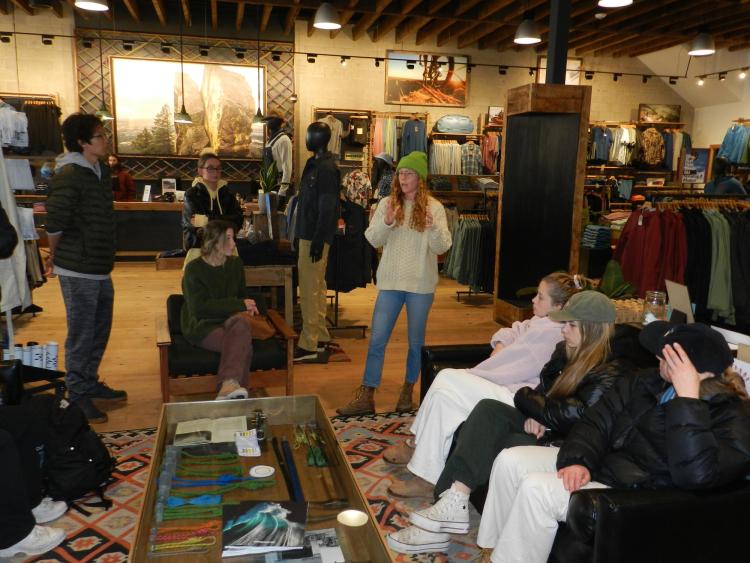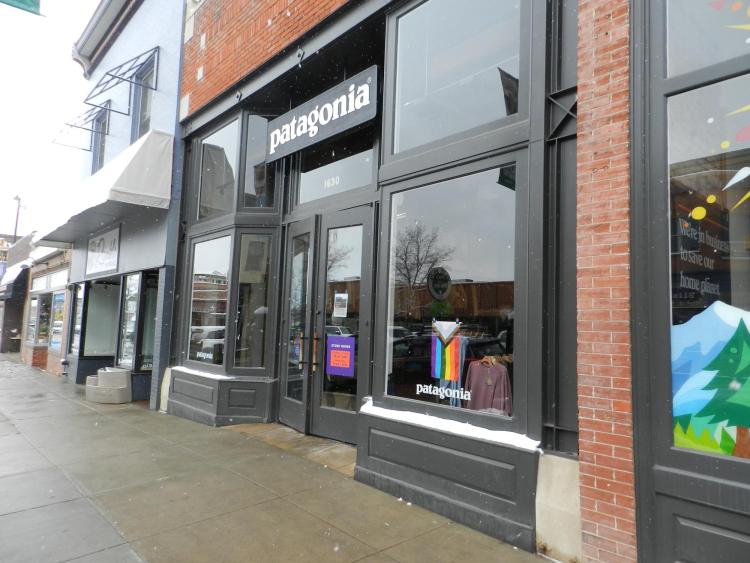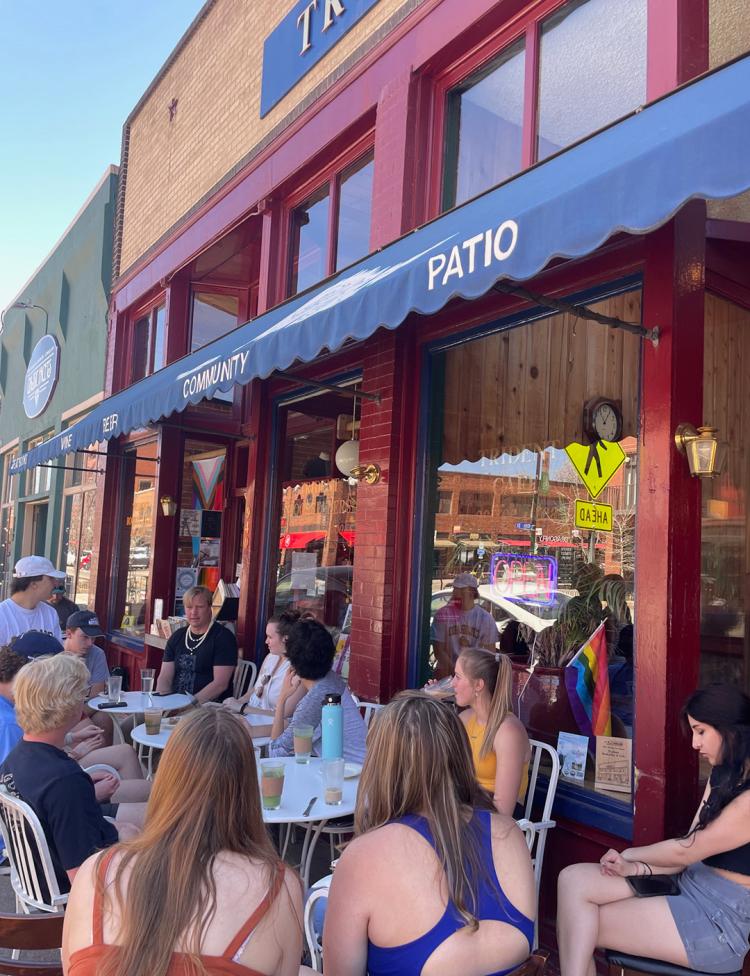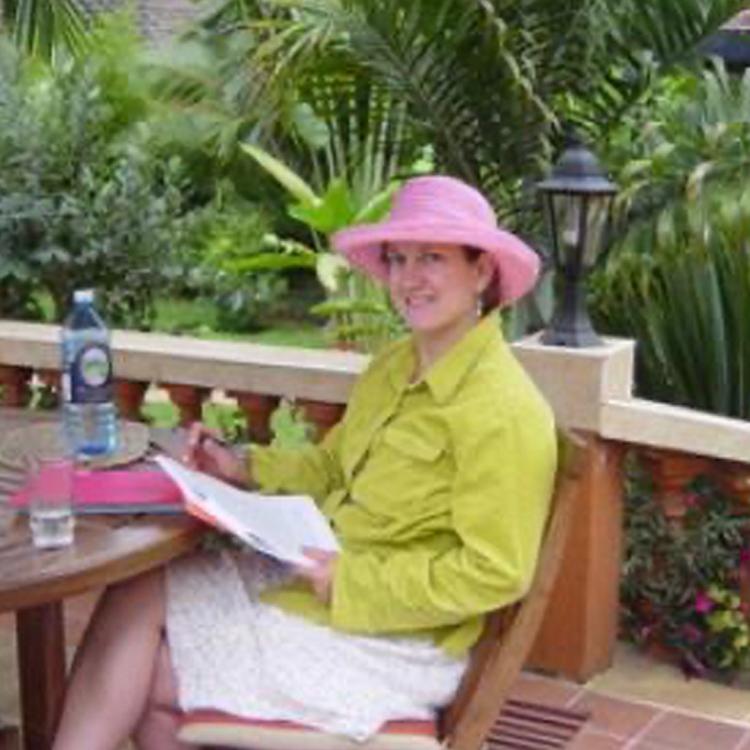Not your parents' business course
The Social Entrepreneurship and Sustainability class focuses on using business innovations to address real-world needs
If tomorrow’s college graduates can successfully marry profit and purpose to address real-world problems, the sooner they can start the better.
That’s the premise behind the Social Entrepreneurship and Sustainability (SSIR 1010) class for first-year students, part of the one-year Stories and Societies Residential Academic Program (RAP) at Sewall Hall on the University of Colorado Boulder campus.
At first blush, the class sounds a bit like a business course with a dash of social responsibility, but there is much more to it than that, according to Laura DeLuca, instructor for the course.

Mallory Fahey (in green hat and white sweater), the sustainability coordinator for the Patagonia store in Boulder, talks with students in the Social Entrepreneurship and Sustainability class about the company’s commitment to environmental causes. She noted that Patagonia provided $220,000 in grant funding to 16 environmental groups in Colorado in 2022.
“Whereas Leeds (School of Business) has a bit more of a technical business focus, this class is more on the stories and human dimension—understanding the motivations of entrepreneurs and the issues they sought to address,” she says. “And then at the end of the course, students create a social innovation project solving a problem they care about. So students use lessons from real-life entrepreneurs to apply to their own projects.”
This course counts toward the arts and sciences certificate in social innovation run by Don Grant in the Sociology Department.
DeLuca says the course is appealing to students in part because of the “immersion learning” aspect of learning directly from entrepreneurs and hands-on activities, rather than rote academic teaching in a classroom. Additionally, the course is appealing to students because of the individualized attention they receive, thanks to the small class size, according to DeLuca. This semester’s class comprises 19 students, reflecting a roughly even number of men and women.

Students have taken field trips to several local businesses that operate at the intersection of innovation and social entrepeneurship, including the Patagonia store on Pearl Street.
A big part of the course, DeLuca says, is helping students to develop a problem-solving skills using an entrepreneurial mindset. Another important goal is to learn more about the “innovation and entrepreneurship” ecosystem on the campus and in the local community.
Boulder is an innovation hub
Boulder is fertile ground for businesses operating at the intersection of innovation and social entrepreneurship, DeLuca says, noting the community’s reputation as “the Silicon Valley for natural foods” as well as an adventure hub for exploring the great outdoors.
Students have been fortunate to be able to tap into that expertise, as many local entrepreneurs have been happy to share their stories during in-person visits to the classroom or on student field trips to businesses in the community, according to Deluca.
Recently, Pemba Sherpa, who immigrated from the mountain kingdom of Nepal to Boulder when he was just 19, shared his story with the class of founding Sherpa Chai Tea Co., Sherpa’s Adventure restaurant and Sherpa Ascent International, a climbing expedition business in Nepal.

After spending part of an afternoon learning about employee-owned Trident Booksellers & Café, students had the opportunity to enjoy a cold beverage on the company’s front patio.
Along the way, Pemba Sherpa has used his success in business to help his native village in remote, rural Nepal by funding the construction of a bridge to connect it to nearby communities and a hydroelectric plant to provide power. Next up is the construction of a medical clinic to serve his community.
A recent field trip featured a visit to the Boulder Patagonia store, an outdoor gear and clothing manufacturer and retailer that began as a humble, family-owned business in the 1970s but has since grown into a powerhouse in the outdoor market, with estimated yearly revenues of $1.5 billion.
The company also is widely recognized for annually pledging 1 percent of its sales for the preservation and restoration of the natural environment, which Patagonia says has netted $140 million in contributions to environmental causes to date.
Students toured Patagonia’s store and learned from its sustainability coordinator, Mallory Fahey, about the company’s commitment to “People, Planet, Profits.”
Not every organization that students are exposed to during the course have achieved the financial heights of Patagonia, but then success looks different to individual entrepreneurs, DeLuca says, pointing in example to the owners of Bobos Bakery, which makes sustainably sourced, gluten-free snack bars and pastries while supporting a variety of charities; Nude Foods Market, which runs a zero-waste grocery store; and Trident Booksellers and Café, a 40-plus-year-old business started by two local Buddhists that is an employee-owned company and which supports a variety of community activities. Students will take a field trip on April 11 to see Trident’s operations for themselves.
DeLuca says one of her goals with the class is to expose students to a diverse group of entrepreneurs, including women, people of color and others from different races, ages, ethnicities and backgrounds. She says she also attempts to expose students to business owners who are different stages in their careers and different ages, although most of them tend to be people who are in the 40s or 50s and are at a point in their lives where they are happy to share reflections on their lives and careers.
For example, David Secunda, founder of Advid4Adventure, shared his story of launching an outdoor adventure company for youth. Avid4Adventure offers day and overnight summer camps in California, Colorado, and Oregon that reconnect kids with the natural world. Another outdoor innovator, Lisa Smith of Women’s Wilderness, shared her story of leading women of color on outdoor adventures in Colorado through the Trailblazer program.
DeLuca also includes younger innovators, such as Rob Dodge, water quality specialist and logistics specialist for Epic Water filters, as well as Sophie Skogaard and her partner, Howard Gibbs-Hobgood, who make flavorful raw vegan desserts and meals. These 20-something entrepreneurs are recent CU-Boulder grads who are easier for students to relate to in terms of life stage, given that they are only four or five years older than them.
Asking thoughtful, ‘hard questions’
While students are respectful, DeLuca says she encourages them to ask the entrepreneurs thoughtful, “hard questions” about their business practices regarding sustainability and to share their failures as well as successes. Students are expected to do a bit of research on the companies and their founders in advance of meetings so they can ask thoughtful questions, she notes.

Laura DeLuca, the instructor for the Social Entrepreneurship and Sustainability class for first-year students, says that one of her goals with the class is to expose students to a diverse group of entrepreneurs, including women, people of color and others from different races, ages, ethnicities and backgrounds.
DeLuca describes the interactions between students and entrepreneurs as a “win-win,” noting that business owners sometimes get ideas on how to improve or expand upon their operations in speaking with students.
For their part, the first-year students who take the class gain an appreciation of the local business community that they might not otherwise see, she says, noting students tend to spend most of their time on the campus.
After meeting with entrepreneurs, students are tasked with writing one- or two-page reflection papers where they are expected to offer their assessments of the business’s operation, share any “aha moment” takeaways and offer any possible thoughts they had about the presentation.
For the final class assignment, students will present a social-innovation plan that’s designed to address a need that they see on a topic that is important to them. For example, Lily Patrick is working on an initiative she calls “Unforgotten,” which would collect and share the stories of senior citizens at nursing homes, so the stories of their lives are not forgotten; Camden Horner is working on a venture plan to fund performing arts education in Colorado public schools; and Tony Puthuff is working on an initiative to address the high cost of mental health counseling.
Summing up the class, DeLuca says, “The students gain fluency not only in researching and writing, but also come away with an appreciation for what it takes to create, organize and manage an enterprise to achieve social change.”

